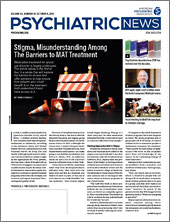The American Geriatrics Society’s Beers criteria generally caution against the use of anticholinergic medications in older patients because of the risk of confusion and memory loss, yet many older people take these drugs to treat conditions ranging from depression to overactive bladder to seasonal allergies. Now a study published in JAMA Internal Medicine suggests another potential risk for certain anticholinergics: dementia.
Carol A. C. Coupland, Ph.D., a professor of medical statistics in primary care at the University of Nottingham, and colleagues compared the health records of 58,769 British adults aged 55 years and older who had dementia with those of 225,574 peers who did not have dementia. The team also analyzed anticholinergic prescriptions written over a 10-year span before the patients’ dementia diagnosis or, for patients who did not develop dementia, an equivalent timeframe. They broke the patients’ total number of anticholinergic doses into five categories based on the number of doses taken over the 10-year span: 0, 1 to 90, 91 to 365, 366 to 1,095, and more than 1,095.
Patients who took the most doses of anticholinergics were roughly 50% more likely to develop dementia than those who did not take anticholinergics. The risk was greatest for those who took anticholinergic antipsychotics, followed by those who took bladder antimuscarinics, antiparkinson agents, antiepileptics, and antidepressants. Risk also increased for patients who took antivertigo medications, but only for those who took the second greatest number of doses (366 to 1,095). The associations were strongest in patients who were diagnosed with dementia before they turned 80 years old.
There were no significant increases in dementia risk associated with anticholinergic skeletal muscle relaxants, gastrointestinal antispasmodics, antiarrhythmics, antimuscarinic bronchodilators (used to treat chronic obstructive pulmonary disease [COPD] and asthma), or antihistamines.
The risks were generally higher for vascular dementia than for Alzheimer’s disease, a finding not seen in other studies to date. The researchers said this raises questions about the ways that anticholinergics may increase risk. “These may include vascular and inflammatory changes, as well as the more obvious mechanism of chronic cholinergic depletion,” they wrote. “Perhaps the mechanism underlying the potential effects of anticholinergic drugs is not solely through blocking acetylcholine and causing an excess of Alzheimer disease, so future research should give consideration to possible mechanisms.”
The researchers acknowledged several limitations to the study, mainly that some patients may not have taken their medications as prescribed, so their exposure to anticholinergics may have been misclassified. “This misclassification … might explain the lack of association for antihistamines and the highest exposure category of antivertigo drugs,” they wrote.
The researchers adjusted the results to account for factors known to increase risk for dementia, such as smoking and diabetes, and for the conditions for which the anticholinergics may have been prescribed, such as COPD or schizophrenia.
Regardless, the study should not be used to imply causation, said Tom Dening, M.D., a professor of dementia research at the Institute of Mental Health at the University of Nottingham and a researcher in the study. “Despite the long lead-in period in this study, we can’t be totally confident that these drugs cause dementia, as there may still be mediating factors that we have not accounted for,” Dening told Psychiatric News.
Yet, psychiatrists need to be aware of the findings and consider whether medications have anticholinergic effects before prescribing or deprescribing them, he added. “They will have anxious patients seeking advice as to whether to continue with medications, but of course they need to balance out future risks against current efficacy of treatment when having these discussions with patients,” Dening said.
“Deprescribing makes the most sense when someone has a small likelihood of benefiting from a medicine or never needed it to begin with,” said Maureen C. Nash, M.D., M.S., a member of APA’s Council on Geriatric Psychiatry. “If your life expectancy is less than five years, then many classes of medication will no longer benefit you.”
Nash urged caution in deprescribing anticholinergic antipsychotics or antidepressants if a patient is doing well on them because there is no guarantee that restarting the medications will work as effectively if the patient relapses.
“This is a real risk that people with serious mental illness face and should always be a part of the discussion about risks, benefits, and alternatives,” Nash said. “These are among the questions to ask before considering a change: How many medications did this person have to try before finding something that worked? How severe has the patient’s illness been in the past? What is the family history of suicide or severe illness?”
Nash added that every treatment decision should be based on an understanding of not only the risks and benefits of treatment but also the risks of the patient’s illness or symptoms.
This study was supported by the National Institute for Health Research, the University of Nottingham, Care East 15 Midlands, MedTech, and the In Vitro Cooperative. ■
“American Geriatrics Society 2019 Updated AGS Beers Criteria for Potentially Inappropriate Medication Use in Older Adults” is posted
here. “Anticholinergic Drug Exposure and the Risk of Dementia: A Nested Case-Control Study” is posted
here.


